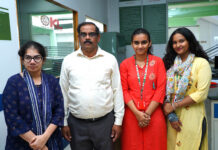BENGALURU / November 9, 2021 – The trend among educated, career-oriented women of getting married late and delaying pregnancies to a later stage in life is leading to an increase in the burden of infertility where they are finding it difficult to conceive naturally. The use of assisted reproductive technologies (ART) by infertile couples is showing an increase of 5-10% every year, according to renowned Laparoscopic Surgeon and Fertility Specialist Dr. Vidya V Bhat, who is the Medical Director of RadhaKrishna Multispecialty Hospital, Bengaluru.
Said Dr. Vidya V Bhat: “The recent phenomenon of reduced fertility among Indian women is caused by delayed marriages, obsession regarding one’s career, and use of modern contraceptives. Postponement of childbearing is a new behavioral change seen in Indian women, like in many other countries in the world as education levels rise. The average age of Indian urban women at their first pregnancy, and the number of pregnancies in women over 35 years of age, have been steadily rising. As the age of women increases, the chances of them getting pregnant reduce significantly.

Important Announcement – EasyShiksha has now started Online Internship Program “Ab India Sikhega Ghar Se”

This is due to decreased frequency of sexual intercourse, lower quality of uterus, and aging egg cells resulting in poor-quality embryos. There is a reduction in intrinsic fertility potential of egg cells after 35 years of age. The decline in Infertility begins around 32 years of age and becomes rapid around 37 years of age. It is best for women to bear children between 25 to 33 years of age. Women who delay pregnancy more than this will face fertility challenges.”
Delayed childbearing impacts the health of both women and children. Said Dr. Vidya V Bhat: “Delayed pregnancies could be the reason for rising in cases of gestational diabetes among pregnant women, which sometimes even turns into type II diabetes. Women having late pregnancies have higher chances of suffering from chronic hypertension from the beginning of their pregnancy. They may also face issues during labor, such as non-progression of labor and non-descent of the fetal head. There is also an increased risk of spontaneous abortion in women above 35 years of age, as well as of chromosomal anomalies being found in the baby. Obesity causes a lot of problems with respect to fertility. Women who put on a lot of weight during pregnancy may face metabolic syndrome and even recurrent loss of pregnancy.”
Many women who are single and focused on their careers in their twenties and thirties prefer to delay childbearing. They are increasingly opting for egg freezing and surrogacy as options for having a child later in life when they are ready to settle down. However, success is not guaranteed in these cases, said Dr. Vidya V Bhat. According to estimates from the Society of Assisted Reproductive Technology based on data from Indian women, the success rate of IVF is 55.6% under age 35. This declines to 40.8% in the 35-37 age group, 26.8% in the 38-40 age group, 12.6% in the 41-42 age group, and 3.9% in the age group above this. In cases of surrogacy, pregnancy rates from embryo transfer are about
53.6%. Said Dr. Vidya V Bhat: “In life everything is important. Women should keep their personal and work
lives balanced, and not treat their work-life as more important than personal life. Women should
keep that in mind after marriage when they decide to postpone pregnancy.”
WHO estimates the overall prevalence of primary infertility in India to be between 3.9% to 16.8%.
For more information, please contact:
According to Dr. Vidya V Bhat, Laparoscopic Surgeon and Fertility Specialist and Medical Director of RadhaKrishna Multispecialty Hospital, Bengaluru. As per the results of a large-scale survey conducted across India in 2020, about 16% of women between 20-29 years suffer from PCOS. “High levels of male sex hormones (androgens) and irregularity in the production of sugar levels in the bloodstream causing insulin resistance adversely affect a woman’s menstrual cycle. This condition can prevent the release of an egg on a regular basis, or even stop it completely, which makes it challenging for patients with PCOS to conceive easily. Sometimes it can even lead to miscarriage,” said Dr. Vidya V Bhat.
Top Courses in Software Engineering
Obesity is a common finding in women with PCOS, affecting 40–80% of patients. Other causes include hormonal imbalance, stress levels, lifestyle changes, insulin resistance, and metabolic defects. The treatment of PCOS-induced infertility involves monitoring ovulation, surgery for improving fertility, assisted reproductive technology, medications, and weight management. PCOS is a common but serious endocrine disorder in women of reproductive age that can lead to lifelong complications and other serious conditions. Initially, this condition is asymptomatic in young
girls, progressing toward menstrual irregularities, obesity, hyperandrogenism in late puberty.
Eventually, it leads to insulin resistance, hypertension, type 2 diabetes, cardiovascular diseases, and infertility around middle age. Yet, many women remain unaware that they are suffering from PCOS, according to the doctor. Of late, this disease is on the rise due to environmental changes as well as lifestyle disorders. India has witnessed a spike of 30 percent in cases of PCOS in the last few years, a trend which got exacerbated due to the lifestyle changes enforced by the pandemic. Being home-bound, lack of exercise, online ordering of junk food, binge-watching TV, and irregular sleep patterns have led to an increase in average weight gain among women. This, coupled with ignoring irregular or heavy menstrual cycles in the lockdown period, is driving the spike in PCOS cases.
Said Dr. Vidya V Bhat: “Irregular follow-ups with the doctor during the Covid times is leading to an increase in the incidence of PCOS, especially among women who are undergoing treatment for infertility. This disorder is also linked with higher levels of circulating insulin, and there is a spike in the number of diabetic patients during the lockdown. Sedentary lifestyle and becoming a couch potato are increasing the chances of relapse of PCOS inpatients, or the disorder becoming much more severe with increased symptoms.”
PCOS can happen due to causes such as excessive consumption of saturated fat, weight gain, inflammation, chemicals, and hormonal imbalance. Lifestyle management is very important for PCOS patients, including regulated diet, physical exercise, and management of blood sugar and hypertension.
For more related content visit Easyshiksha and Hawkscode
Empower your team. Lead the industry
Get a subscription to a library of online courses and digital learning tools for your organization with EasyShiksha
Request NowQ. Are EasyShiksha's internships truly free?
Yes, all internships offered by EasyShiksha are completely free of charge.
Q. How can I apply for an internship with EasyShiksha?
You can apply by visiting our website, browsing available internships, and following the application instructions provided.
Q. What types of internships are available through EasyShiksha?
EasyShiksha offers a wide range of internships across technology, business, marketing, healthcare, and more. Opportunities are continuously updated.
Q. Will I receive a certificate upon completing an internship?
Yes, upon successful completion, you will receive a certificate recognizing your participation and achievements.
Q. Are EasyShiksha's internship certificates recognized by universities and employers?
Yes, the certificates are recognized by universities, colleges, and employers worldwide.
Q. Is the download of certificates free or paid?
Access to internships and courses is free, but there is a small fee to download certificates, covering administrative costs.
Q. When can I start the course?
You can choose any course and start immediately without delay.
Q. What are the course and session timings?
These are fully online courses. You can learn at any time and pace. We recommend following a routine, but it depends on your schedule.
Q. What will happen when my course is over?
After completion, you will have lifetime access to the course for future reference.
Q. Can I download the notes and study material?
Yes, you can access and download course materials and have lifetime access for future reference.
Q. What software/tools would be needed for the course?
All necessary software/tools will be shared during the training as needed.
Q. I’m unable to make a payment. What should I do?
Try using a different card or account. If the problem persists, email us at info@easyshiksha.com.
Q. Do I get the certificate in hard copy?
No, only a soft copy is provided, which can be downloaded and printed if required.
Q. The payment got deducted but shows “failed”. What to do?
Technical errors may cause this. The deducted amount will be returned to your account in 7-10 working days.
Q. Payment was successful but dashboard shows ‘Buy Now’?
Sometimes payment reflection is delayed. If it takes longer than 30 minutes, email info@easyshiksha.com with the payment screenshot.
Q. What is the refund policy?
If you face technical issues, you can request a refund. No refunds are issued once the certificate has been generated.
Q. Can I enroll in a single course?
Yes, select the course of interest, fill in the details, make payment, and start learning. You will also earn a certificate.
Q. My questions are not listed above. I need further help.
Contact us at info@easyshiksha.com for further assistance.
ALSO READ: Wonderla-offers-free-tickets-for-childrens-day
Get Course: A-complete-course-on-digital-marketing-advertising











































































